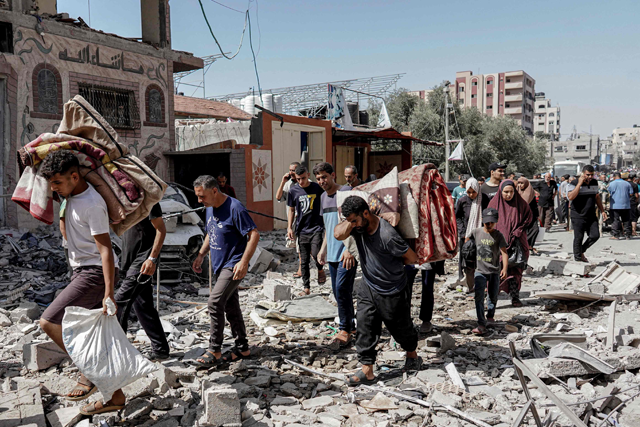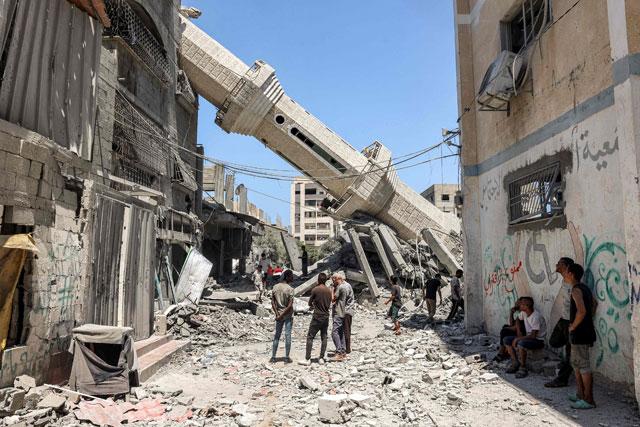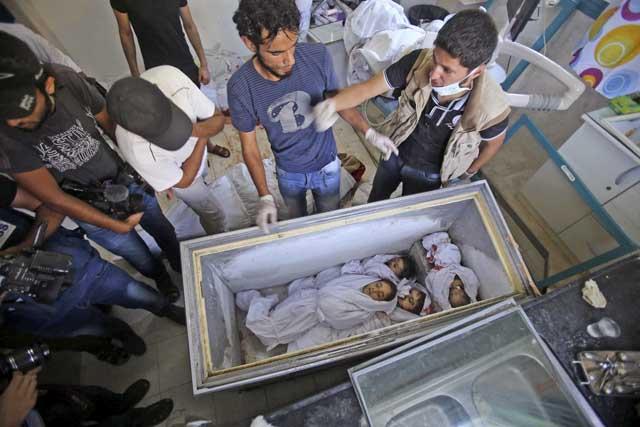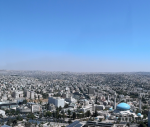You are here
Israel bombs Gaza after US criticises high civilian toll
By AFP - Jul 16,2024 - Last updated at Jul 16,2024
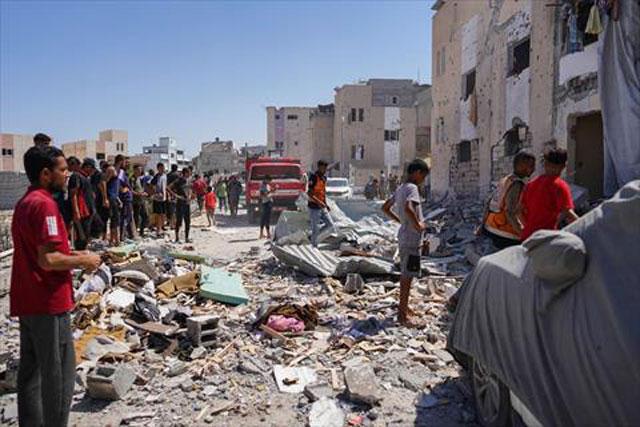
Palestinian Civil Defence members inspect a damaged house that was hit in Israeli bombardment on Khan Yunis in the southern Gaza Strip on July 16, 2024 (AFP photo)
GAZA STRIP, Palestinian Territories — Authorities in Gaza said dozens of Palestinians were killed on Tuesday in three separate strikes, as Israel pounded the territory despite renewed US criticism of the high civilian toll.
Gaza civil defence spokesman Mahmud Bassal said the three air strikes killed at least 44 people and wounded dozens within an hour across the war-ravaged Palestinian territory. Israel said it carried out two of the strikes.
The health ministry said a strike on a fuel station in Al Mawasi in southern Gaza killed 17 people, and the Palestinian Red Crescent said a separate strike at almost the same time on the UN-run Al Razi School in the Nuseirat refugee camp in central Gaza killed five people.
The civil defence agency said the third strike was on a gathering of people near a roundabout in northern Gaza. It did not give a precise toll breakdown.
Hours earlier, US Secretary of State Antony Blinken told two senior Israeli officials of Washington's "serious concern" following deadly Israeli strikes in Gaza, his spokesman said.
“We have seen civilian casualties come down from the high points of the conflict... but they still remain unacceptably high,” spokesman Matthew Miller said after Blinken met Strategic Affairs Minister Ron Dermer and National Security Adviser Tzachi Hanegbi.
Washington has been pushing for a truce between Israel and Hamas.
But Hamas political leader Ismail Haniyeh said Sunday the group was pulling out of indirect talks for a deal in protest at Israeli “massacres”, including a massive strike on Sunday that Gaza’s health ministry said killed at least 92 people.
Hamas was ready to return to the indirect talks once Israel “demonstrates seriousness in reaching a ceasefire agreement and a prisoner exchange deal”, he said.
On Tuesday, Israeli prime minister Benjamin Netanyahu vowed to ramp up pressure on Hamas.
“This is exactly the time to increase the pressure even more, to bring home all the hostages — the living and the dead — and to achieve all the war objectives,” he said.
The Israeli military said its aircraft struck about “40 terror targets” in Gaza, including “sniping posts, observation posts, Hamas military structures, terror infrastructure, and buildings rigged with explosives”.
It said troops were continuing targeted raids in the southern city of Rafah and in central Gaza.
Palestinian Red Crescent medics said they recovered four bodies from a house outside the southern city of Khan Yunis and another from Nuseirat camp.
Israeli offensive has killed at least 38,713 people, also mostly civilians, according to figures from the Gaza health ministry.
Israel’s military has also detained scores of Gazans, who have made allegations of torture, rape and other abuses in custody that Israeli authorities have denied.
Palestinian lawyer Khaled Mahajna said Monday that prisoners had recounted guards using “electric prods” on inmates’ bodies.
In one prisoner’s case, a “fire extinguisher tube was inserted into his buttocks and the fire extinguisher was turned on,” Mahajna said after visiting detained Palestinian journalists.
He said prisoners were handcuffed when they ate the meagre meals provided, while detainees reported widespread disease and untreated wounds.
Five Israeli human rights groups have gone to court over conditions at the Sde Teiman desert camp where Gazans are being held. Israeli officials insist they act within the bounds of international law.
Indirect talks on ending the devastating war have been brokered by Qatar and Egypt, with US support, but months of negotiations have failed to bring a breakthrough.
At the end of May, US President Joe Biden outlined a ceasefire roadmap he said had been drawn up by Israel that triggered an intensification of the talks.
But despite meetings in both Cairo and Doha, there has been no sign of progress on how this might be implemented.
Critics in Israel, including tens of thousands of demonstrators demanding a deal to bring home the hostages, have accused Netanyahu of prolonging the war.
The war has forced 90 percent of Gaza’s 2.4 million people to flee their homes. Many have sought refuge in UN-run schools, seven of which have been hit by Israeli strikes since July 6.
“Why do they target us when we are innocent people?” asked Umm Mohammed Al Hasanat, sheltering with her family at a UN-run school in Nuseirat, which was among those hit.
“We do not carry weapons but are just sitting and trying to find safety for ourselves and our children.”
Related Articles
GAZA STRIP, Palestinian Territories — Israel said its forces rescued on Saturday four hostages alive from a Gaza refugee camp where the gove
GAZA, Palestinian Territories — Israel kept up its air strikes on Gaza Wednesday as hopes fade for a US-announced ceasefire plan.Hamas polit
An Israeli air strike killed 10 people and wounded about 30 on Sunday in a UN-run school in the southern Gaza Strip, a Palestinian official said, as dozens died in Israeli shelling of the enclave and Hamas fired rockets at Israel.


